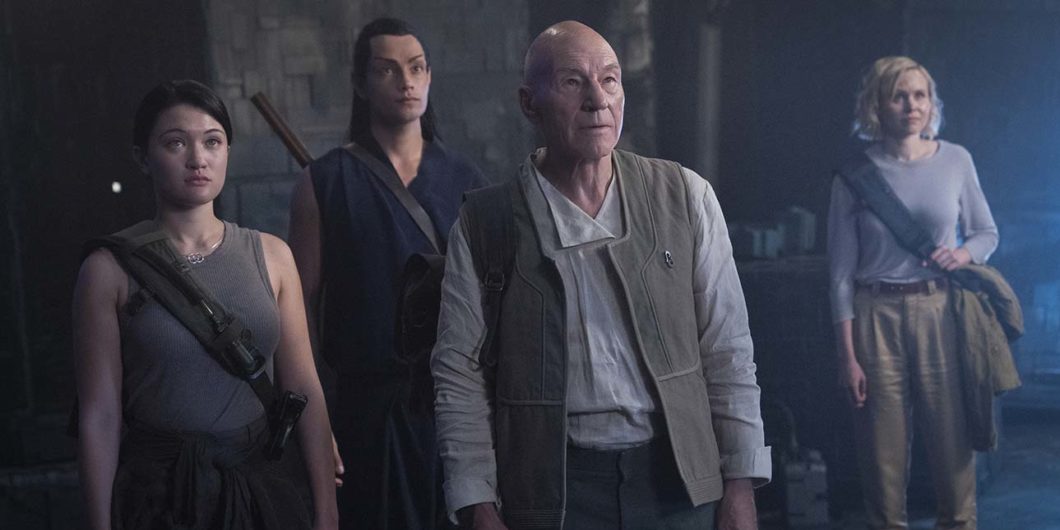Christianity's dualistic claim is uniquely suited to provide the limits sought by liberalism and constitutionalism.
Exhausted in Space
At the beginning of the original Star Trek series (1966-1969), Captain James T. Kirk (William Shatner) intones, “Space: the final frontier. These are the voyages of the starship Enterprise. Its five-year mission: to explore strange new worlds. To seek out new life and new civilizations. To boldly go where no man has gone before!” The first Star Wars film is subtitled A New Hope (1977). But if the two gigantic, intergenerationally popular science fiction franchise’s most recent entries tell us anything, it is that Star Trek’s confident adventurousness and Star Wars’ hope for better times are at an end. The most recent entries in both franchises, for all their other differences, strike the same note: the hopes for the future we used to have that rested in current or future institutional strengths were mere illusions, and there is no clear and coherent path forward. Given these two franchise’s capacity to mirror and sometimes shape our own attitudes, we should take note. That being said, it is far from clear that the elites in charge of both franchises can teach us the right lessons. Instead, our elites and creatives are morally and intellectually exhausted, even to the point of self-loathing. In some cases, they seem to desire death.
Star Trek debuted in 1966, coming out of the optimism of Kennedy-era, 1960’s liberalism, during the period proximate to but still not fully cognizant of the explosive changes in store for the world through the revolutionary liberations of 1968. Star Wars debuted in 1977, emerging in the cynical seventies, in the immediate aftermath of Woodstock, the time of American ambivalence about the Vietnam War, Watergate, economic downturns, domestic civil unrest, and general malaise. Both Star Trek and Star Wars projected hopeful dreams about the future based either on institutional strength and goodness (Star Trek’s United Federation of Planets) or reform of a crucial institution (Star Wars’ Jedi Order) carried out by the innocent, heroic outsider.
Star Trek’s Federation was based on a universal regime of human rights combined with a respect for multiculturalism. After unifying the planet Earth, the Federation’s mission is to extend the blessings of human rights and multiculturalism throughout the galaxy by offering membership in the Federation to other civilizations. Star Trek combines Kennedy-era space race enthusiasm with a liberal political project.
Generally speaking, Star Trek plots are best when the tension between human rights and multiculturalism are brought straight to the fore, as when Captain Kirk has to choose whether to violate the Federation’s “Prime Directive” not to interfere in a less technologically advanced civilization’s path toward civilizational development, usually on the basis of Kirk’s own judgment about what is right or wrong. The idea that there is some objective, non-historicist standard of right and wrong that undergirds even what it means to be human shows that Star Trek is still rooted in something deeper than 1960’s liberalism, even as it struggles to synthesize its various influences.
Star Trek’s sense of natural right slides away significantly in Star Trek: The Next Generation, which ends up falling into relativism too much. Azet-Bur (Rosanna DeSoto), the daughter of Klingon Chancellor Gorkon (David Warner) in Star Trek VI: The Undiscovered Country, released right in the middle of The Next Generation’s seven-year run (1987-1994), seems to speak directly out of the zeitgeist. After hearing the Enterprise’s officers babble lamely about the Federation’s mission, she bites out scornfully, “If only you could hear yourselves. ‘Human rights.’ Why, the very name is racist. The Federation is no more than a homo sapiens-only club.” The Federation’s explanation of itself in high-minded terms, we have begun to feel even in 1991, merely masks a more sinister—and racist, or speciesist—attempt at hegemony. In fact, Picard’s willingness to abandon principles of natural right in the name of the Prime Directive might be more a symptom of lack of moral self-confidence than a principled conviction that cultural relativism is correct. Frequently, The Next Generation ends arguments about intervention in the name of natural right with the formulation, “Well, you see it that way” (for two examples, see the episodes “Symbiosis” and “Half a Life”), which offer an implicit recognition of the two sides of the argument. But they also display an inability or an unwillingness to come to a decision on the basis of what is right, rather than a belief that there is no right.
As recently as 2009, in the J.J. Abrams cinematic reboot of the film franchise, Captain Christopher Pike (Bruce Greenwood) tries to persuade young Kirk to join Starfleet by describing it as “a peace-keeping, humanitarian armada.” Abrams is clearly trying to regain something of the 60’s Star Trek’s moral confidence. But the thin gruel of humanitarianism is no substitute for the 60’s Kirk’s passion for justice. Just a decade later in Star Trek: Picard, the Federation of Picard is easily manipulated by foreign (Romulan) agents into abandoning its humanitarian mission. Even Jean-Luc Picard himself (Patrick Stewart) has been humbled in Picard: character after character accuses him of arrogance.
Picard has to form a new crew of non-Starfleet and ex-Starfleet misfits in order to complete his mission to protect a young woman, Soji (Isa Briones), who herself exists in an identity category that has yet to have the benefit of the Federation’s extension of rights. Starfleet is no help. It is compromised, corrupt, and impotent to deal with precisely the sort of new life and new, nascent civilization it was originally commissioned to seek out. Even worse, Soji’s people fear the Federation; they suspect the Federation intends to enslave them or wipe them out. The final episode features the Federation ceding its moral and political authority and agency to a marginalized group it still has every reason to suspect of having tyrannical tendencies and ambitions.
Star Wars grows out of the post-Woodstock counterculture, which increasingly views American institutions as deeply compromised by corruption of various kinds, and in need of reform from sources on the margins of power and therefore not yet compromised. Darth Vader (David Prowse and James Earl Jones), right hand man to the despotic Emperor Palpatine (Ian McDiarmid) and himself a fallen member of the Jedi Order, is the perfectly resonant villain. Luke Skywalker (Mark Hamill), the estranged son of Vader who has grown up on the margins of the Galaxy as an innocent rustic, but still heir to Vader’s powers, is the perfectly resonant hero. Of course, George Lucas is not just crafting political propaganda, and in many respects he, like the writers of the original Star Trek series, is drawing upon sources richer than he is fully able to articulate: medieval chivalry, Roman and Byzantine politics, and classical mythology—even as it is refracted and enervated by the pop-Jungian lens of Lucas’s story muse, Joseph Campbell.
The Jedi themselves became corrupt due to their arrogance and obliviousness, overlooking the machinations of the sinister Palpatine from within their midst, even suborning the tempestuous young Jedi apprentice Anakin Skywalker right under the noses of a Jedi council that had already taken special notice of Skywalker’s potential and importance. Luke Skywalker, then, is the new hope for the reform and revival of the Jedi Order through opposing and eventually defeating the tyrannical and murderous galactic Empire. Luke’s idealism and heroism, his capacity for friendship, and his ability to learn from the mistakes of past Jedi show a way forward for the Jedi once again to become “the guardians of peace and justice” in the galaxy, in the words of Luke’s mentor, Jedi Master Obi-Wan Kenobi (Alec Guinness). He even manages to bring Vader back from the depths of his corruption for a final, heroic act of self-sacrifice.
Star Wars: The Last Jedi and The Rise of Skywalker show us the idealized, heroic Luke Skywalker reduced to a shell of a man, brought down by his own failures. Instead of reforming and revitalizing the Jedi Order, Luke has replicated the very same mistakes that led to the Jedi Order’s previous downfall. He could not see the rising darkness in his nephew, Ben Solo, until it was too late. He, too, it turns out, was arrogant, trusting too much in the same Jedi traditions that have already failed.
The two franchises are mirroring our own fears to us: our institutions are arrogant, corrupt, compromised, and ineffective. Even worse, our institutions are enervated because we ourselves are morally and intellectually exhausted. It takes a world-weary Jean-Luc Picard at least three episodes to rediscover his own sense of moral duty and the verve that should flow naturally from it. But neither have much to say to us about hidden wellsprings for renewal. Surely the least believable aspect of the Star Wars prequels is Rey’s preternatural goodness and heroism. On what basis is she so good and heroic? How can she translate her de novo, pristine purity into a teaching or way of life she can hand on? Picard tries, implausibly and incoherently, somehow to conjugate transhumanism, which has always been obsessed with immortality, and a defense of what is authentically human on the basis of our mortality. Both make earnest but hapless gestures toward something better; but it is not even clear to what they are gesturing, let alone why it would be better.
If the limp and, frankly, lazy and half-baked proposals for reform or renewal in Picard and the Star Wars sequels are any indications, we might simply not have any idea what to do now; and we might have no inclination to do the work necessary to figure out the problem. We, like our favorite sci-fi franchises, are exhausted. At the end of Picard, Commander Data (Brent Spiner) tells Picard, “I would be profoundly grateful if you terminated my consciousness.” He explains, “Mortality gives meaning to human life, Captain. Peace, love, friendship, these are precious, because we know they cannot endure.” Captain Kirk never would have tolerated such reasoning, let alone facilitated the euthanizing of one of his friends, as Picard does. One does fear that, just like Commander Data, we might simply want to die.
On the other hand, maybe the fan controversies—especially around the Star Wars sequels—are a good sign. Perhaps the Hollywood elite that controls and runs these franchises sees less cause for hope than the ordinary people who are their fans. After all, both Roddenberry and Lucas were themselves idiosyncratic visionaries who were turned down at first by the Hollywood establishment institutions who were out of touch with the insights and instincts of their audiences. The new versions of these franchises have rejected, but not refuted, the hopes they once entertained. Fan rage about the new versions seem to boil down to bafflement about why those original hopes have been rejected. Given everything that has transpired culturally and politically since the 60’s and 70’s, there is no doubt that those original dreams have their severe limitations—as conservatives of every stripe have known for decades. But there is no reason to trust the judgments of the elite creatives currently at the helms of both franchises. Maybe these franchises, like the rest of our institutions, once again need the insights of outsiders who don’t have the elites’ besetting death wish and are able to see wellsprings of possible reform in hidden or too-hastily rejected sources.



